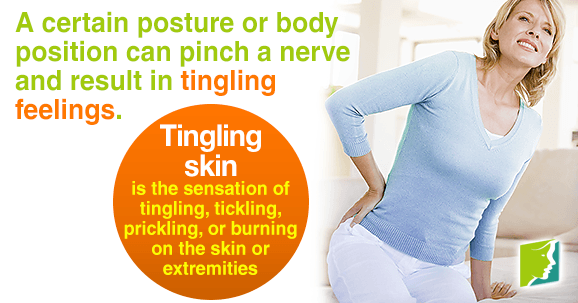Tingling skin, medically known as paresthesia, is the sensation of tingling, tickling, prickling, or burning on the skin or extremities. It is commonly referred to as a "pins and needles" feeling. The tingling sensation is usually temporary, and typically affects the fingers, arms, legs, and feet. While tingling skin can be unsettling and irritating, it is usually not a cause for worry. It can be caused by a number of things, which are mostly harmless. In some cases, however, it can indicate a more serious health concern.
Common Causes
Tingling skin can be caused by everyday occurrences, so it should not incite alarm, although in some cases lifestyle changes or medical attention may be necessary.
Hormone fluctuations
Estrogen affects the central nervous system, so when hormone levels shift during menstruation, pregnancy, or menopause, women may feel tingling extremities more often.
Lack of movement
Sitting or standing in the same position for a long time can cause tingling and numbness because of insufficient blood circulation. If you have a sedentary job, it's important that you take breaks to move around.
Pinched nerve
Sometimes, a certain posture or body position can pinch a nerve and result in tingling feelings.
Tobacco
Smokers often experience tingling extremities and numbness because of poor circulation caused by smoking.
Nutrient deficiencies
Deficient levels of vitamin B12, calcium, potassium, or sodium cause tingling and numbness. If you have a nutrition deficiency that is so extreme it is causing damage to the nervous system, which leads to tingling extremities, it is important to seek medical attention.
More Serious Causes
If tingling skin is experienced in combination with other symptoms - like slurred speech, loss of bladder control, or blurred vision - it could indicate a serious condition.
Nerve injury
Injuries to the neck, lower back, or another part of the nervous system can cause tingling extremities.
Diabetes
Diabetes is a chronic disease in which blood sugar levels are higher than normal. Common symptoms of diabetes include blurred vision, excessive thirst, and tingling skin.
Seizures
Tingling skin is a common symptom of seizures. Seizures also cause loss of vision and tensed muscles.
Stroke
Some of the common symptoms of having a stroke are slurred speech and tingling extremities and numbness.
Multiple sclerosis
Nerves can become damaged in MS, and nerve signals slow down or stop, usually causing abnormal sensations on the skin in the process.
If an underlying medical condition is causing your tingling skin, it is important to seek medical attention immediately. Maintaining a healthy and active lifestyle may prevent some form of tingling skin. Tingling skin often is a symptom that something is wrong with the nervous system, so if your tingling skin persists or is felt in combination with other symptoms, it is important to seek medical attention.
Sources
- de Azevedo Guimaraes, A.C. & Baptista, F. (2011). Influence of habitual physical activity on the symptoms of climacterium/menopause and the quality of life of middle-aged women. International Journal of Women's Health, 3, 319-328. doi: 10.2147/IJWH.S24822
- National Institutes of Health. (2013). Numbness and tingling. Retrieved November 7, 2014, from http://www.nlm.nih.gov/medlineplus/ency/article/003206.htm




